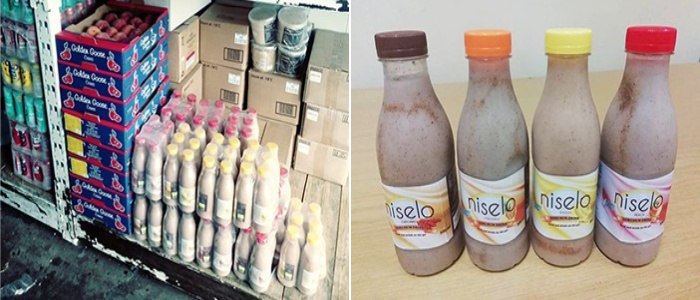
Congratulations to Prof David Katerere, Professor in the Department of Pharmaceutical Sciences and his research team on developing two functional food products, which combine sorghum with probiotic cultures into an instant beverage.

Prof David Katerere, project leader of Niselo products.
Based on Intellectual Property (IP) developed at TUT, which was transferred to the National Food Technology Research Centre (NFTRC) in Botswana, and later to Nutrikon, a start-up company in South Africa, the project has developed two efficient food products, namely Synmba cereal beverage for the Botswana market and Niselo sorghum drink in South Africa.
Both products have been tested and optimised and are at a point where full-scale commercialisation is being initiated in the two markets (Botswana and South Africa). The growing demand for the product has resulted in the consortium producing 15 000 litres and generating an excess of R150 000 in revenue in the two countries.
The research team, consisting of Prof Katerere, Dr Richard Nanzi , Dr Aboyade Seyi and Dr Callistus Bvenura mentioned that the Synmba and Niselo drink will positively influence the nutrition and health of the targeted consumers, create jobs, expand the biotechnology-skills base, incentivise small and medium sorghum farmers and play an important role in improving food and nutrition security in the region.
“A number of diseases and medical complications including diarrhoea, constipation, as well as candida infections may be alleviated by ingestion of symbiotic beverages – such as the Synmba and Niselo drink – taken in adequate amounts on a regular basis. The low glycemic index of sorghum also assists with glucose control in diabetic patients,” Prof Katerere explained.
“The sorghum grain is considered Botswana’s traditional food, and as a crop it is drought tolerant and very healthy. Therefore, we thought that if we could organise ourselves better as a country we could use it to tackle issues of food security. Moreover, manufacturing the drink locally would also mean job creation and additional market opportunities for sorghum producers in the country. We believe that once Synmba has reached the relevant Technology Readiness Level (TRL) used by NFTRC, the technology will then be transferred to the private sector for full scale commercialisation,” NFTRC Acting Managing Director and project partner, Dr Martin Kebakile added.
Dr Kebakile also expressed gratitude to the Botswana Defence Force for the support they have given the project by ordering 50 000 bottles of Synmba. “We are making great strides with positioning Synmba as a healthy alternative. We have also received a tremendous cash injection of 4 million Pula from the Botswana government which will go towards purchasing of equipment.”
Meanwhile in South Africa, marketing channels for Niselo are a combination of informal and formal via street hawkers, independent gymnasia, fruit and vegetable outlets (Fruit Stop in Pretoria) and two pharmacies (La Montagne Pharmacy and Khutsong Pharmacy). Prof Katerere believes that this form of marketing allowed for building gradual demand while scaling up production and generating cash sales.
Each unit of the beverage costs R10, however if one is ordering for resale it costs R8.50 per unit.


Niselo sorghum drinks produced at TUT.
For more information on the Tshwane University of Technology, please contact Willa de Ruyter, Corporate Affairs and Marketing.
Tel: +27 12 382 5352 Email: deruyterw@tut.ac.za



